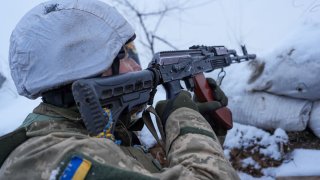
- The U.S. State Department urged U.S. citizens in Ukraine to leave the country immediately, as Russia's military buildup at the border shows no sign of dissipating.
- Russia has repeatedly denied it is preparing to invade its neighbor Ukraine, despite stationing around 100,000 Russian troops at various locations along the border, according to Ukrainian and Western officials.
- Analysts are now questioning whether the West can actually deter Russia, and just how far Western allies are willing to go to defend the country.
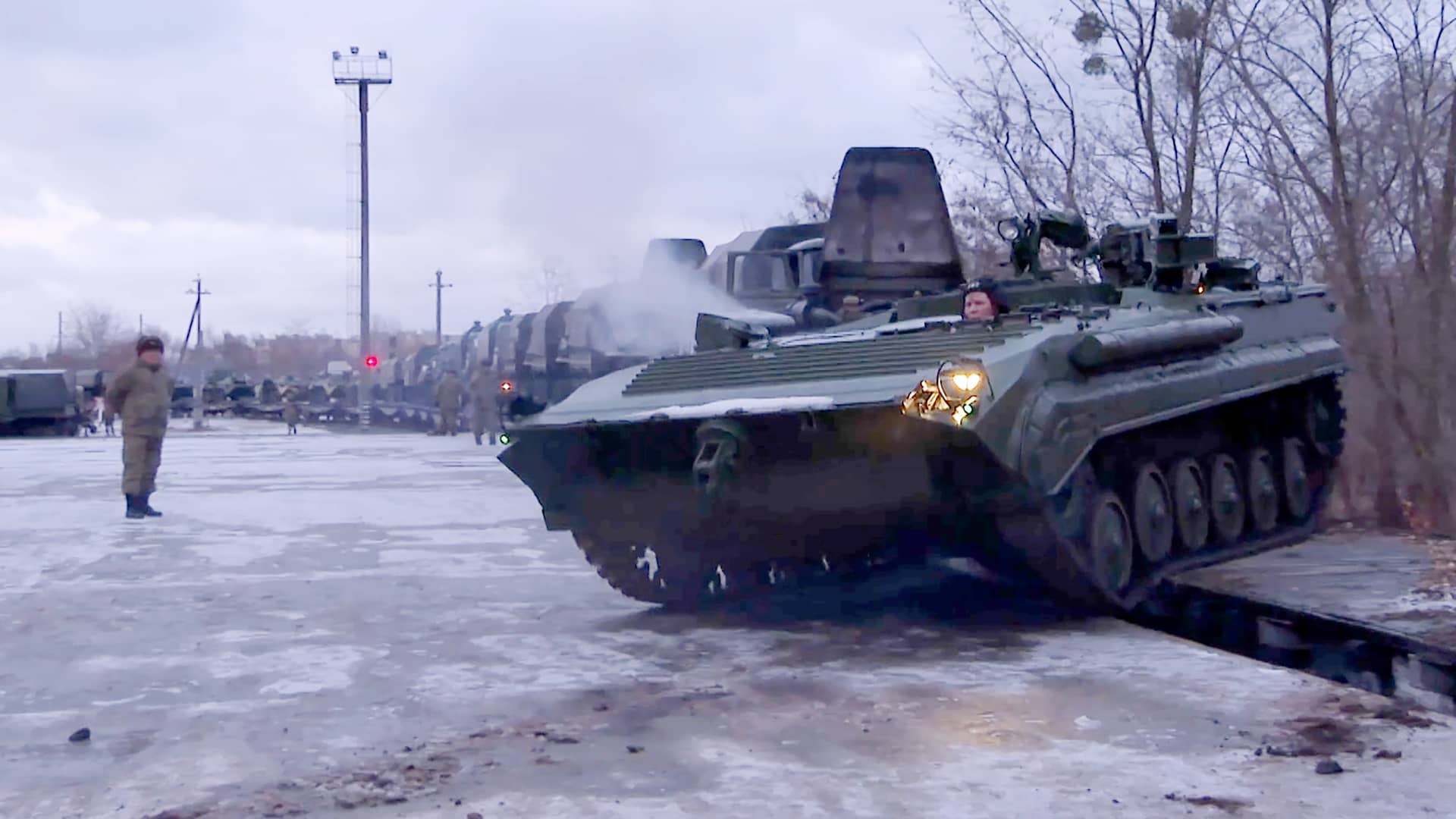
Fears of a Russian invasion of Ukraine are growing, as the military buildup at the border shows no sign of dissipating and crisis talks remain at an impasse.
As the U.S. and U.K. respond with threats of sanctions and more, and withdraw diplomatic staff from their embassies in Kyiv, analysts are questioning whether the West can actually deter Russia, and just how far Western allies are willing to go to defend the country.
We're making it easier for you to find stories that matter with our new newsletter — The 4Front. Sign up here and get news that is important for you to your inbox.
"While Russia continues to send additional troops and weaponry to the Ukraine border, there seem to be some divisions among the Western allies about how to respond," Helima Croft, head of global commodity strategy and Middle East and North Africa research at RBC Capital Markets, said in a note Sunday evening.
"While they have all promised a tough response, the U.K. and the U.S. have gone furthest in pledging crippling economic sanctions and indicating that Russia indeed has invasion plans and is seeking to install a pro-Kremlin leader in Kiev. By contrast, the German naval chief was forced to resign after stating that Putin 'deserved respect' — and suggesting that Berlin should join forces with Moscow against Beijing — and Chancellor Scholz called for 'prudence' in the application of sanctions."

She also noted that Germany has refused to provide Ukraine with military support, in contrast to the U.S. and U.K. In addition, the country has reportedly blocked Estonia from sending German-made weapons to Ukraine.
The U.S. State Department recommended Sunday that all U.S. citizens in Ukraine leave the country immediately, citing Russia's significant military buildup on the border. It also ordered eligible family members of personnel at its embassy in Kyiv to depart the country due to the deteriorating security conditions.
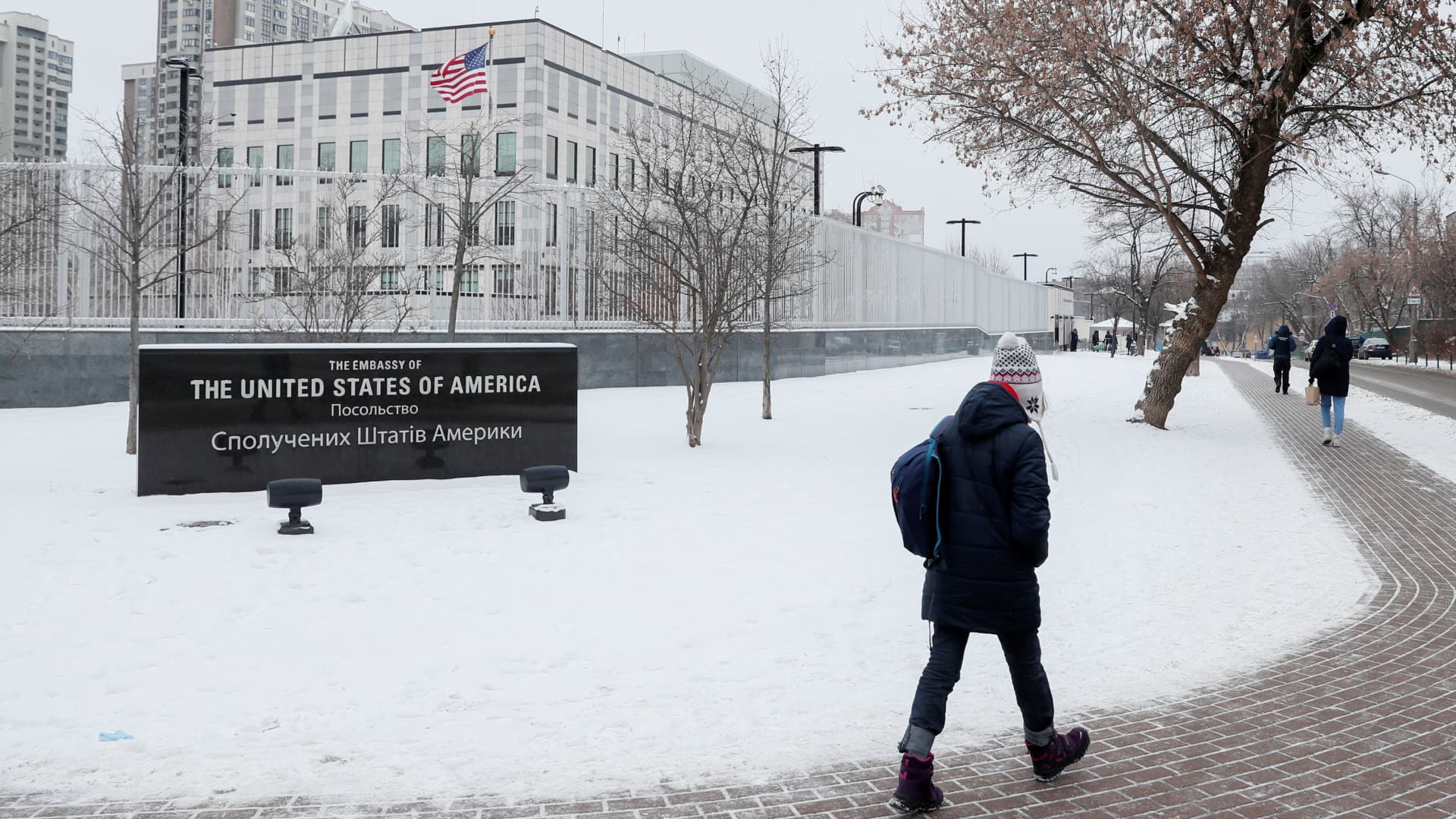
Britain, too, has reportedly started to withdraw diplomatic staff from its embassy in Ukraine, the BBC's diplomatic correspondent said Monday. The move comes after the U.K. accused the Kremlin on Saturday of seeking to install a pro-Russian leader in Ukraine.
Money Report
Russia has repeatedly denied it is preparing to invade its neighbor Ukraine, despite stationing around 100,000 Russian troops at various locations along the border, according to Ukrainian and Western officials, and building up military hardware there.
Russia says it has the right to move military personnel and equipment wherever it likes in the country, and last week accused the West of plotting "provocations" in Ukraine, a country that aspires to join both the EU and NATO as its government under President Volodymyr Zelenskyy seeks closer ties with the West.
Russian President Vladimir Putin, on the other hand, has been a vocal critic of the collapse of the Soviet Union (of which Ukraine was a part) in 1991, and has extolled the historical ties of Russia and Ukraine.
There have been various top-level meetings between Russian, U.S. and NATO officials in recent weeks to try to deescalate tensions, but these have not met with much success.
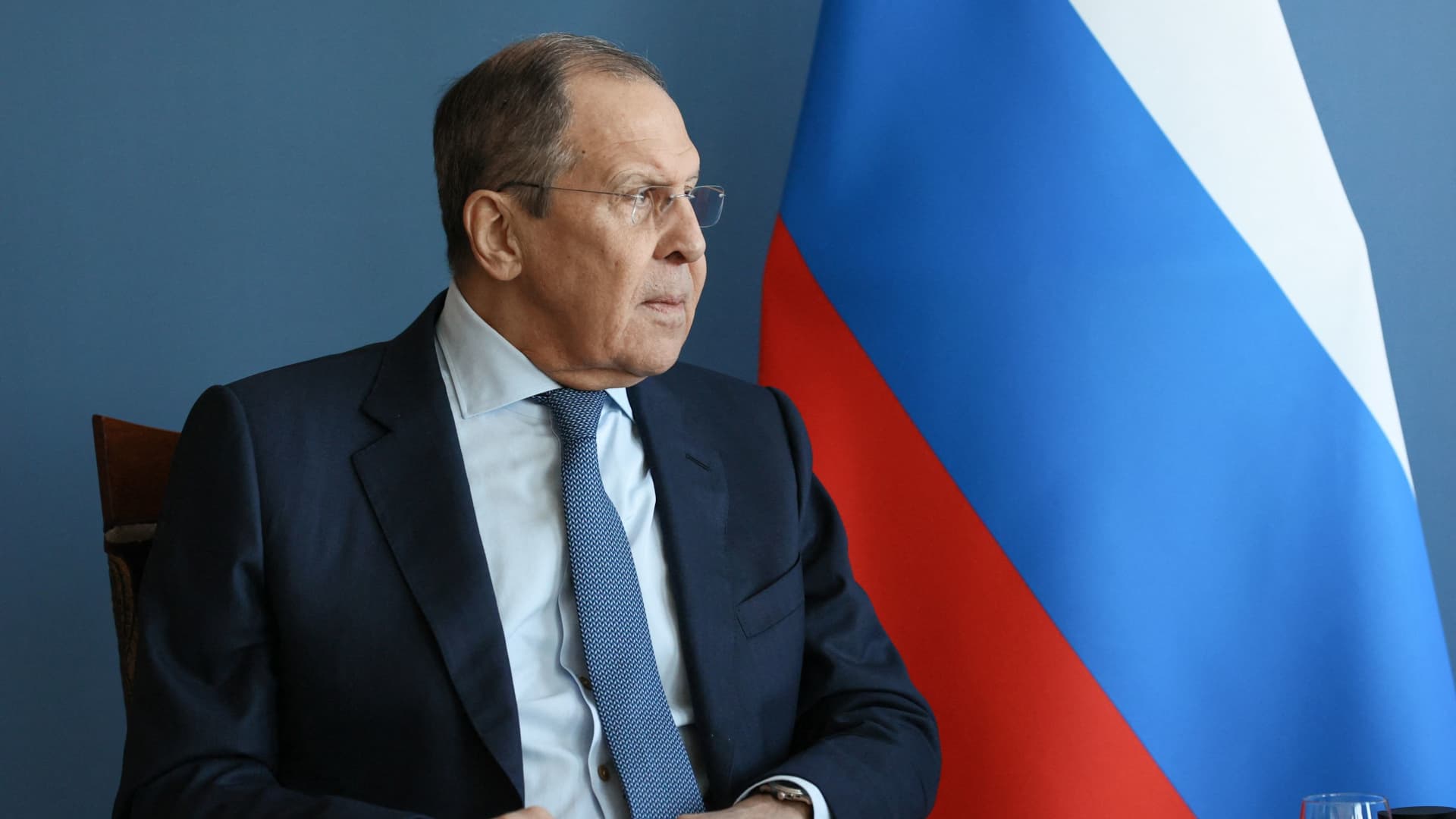
Russia wants legal assurances that Ukraine will not be allowed to join the U.S. and European military alliance NATO, which it has not received. The Kremlin also wants to see NATO roll back military infrastructure and personnel from parts of Eastern Europe, and in the former Soviet countries of Estonia, Latvia and Lithuania. NATO and U.S. officials have also refused those demands.
John Herbst, senior director of the Atlantic Council's Eurasia Center and a former U.S. ambassador to Ukraine, told CNBC on Monday that he thinks the West must "push back hard against Kremlin aggression" — and to do it sooner rather than later.
"We've tried appeasement with Putin. We tried it in 2008 when he went into Georgia, and suffered almost no consequences. We tried it with Crimea, where he also suffered almost no consequences," he said.
Herbst said that U.S. President Joe Biden's proposed framework if Russia escalates in Ukraine — additional sanctions, sending weapons to Ukraine and the deployment of more NATO forces to Russia's border — was reasonable, but "not sufficiently active."
"What we should be doing is we should be moving those forces within NATO now. We should be sending those weapons now," he said. "It seems that the Biden administration is starting to move in those directions. But it needs to be stronger and faster, and we need to do it in conjunction with our allies."
Could more sanctions deter Russia?
The U.S., U.K. and EU have all warned Russia that it will face further crippling sanctions if it invades its neighbor — but Russia is already used to operating under sanctions.
Penalties were imposed on some of its key sectors (like energy and finance) and officials in the wake of its 2014 annexation of Crimea from Ukraine, and its role in pro-Russian uprisings in eastern Ukraine, where lower-level fighting has continued between Ukrainian troops and pro-Russian separatists ever since.
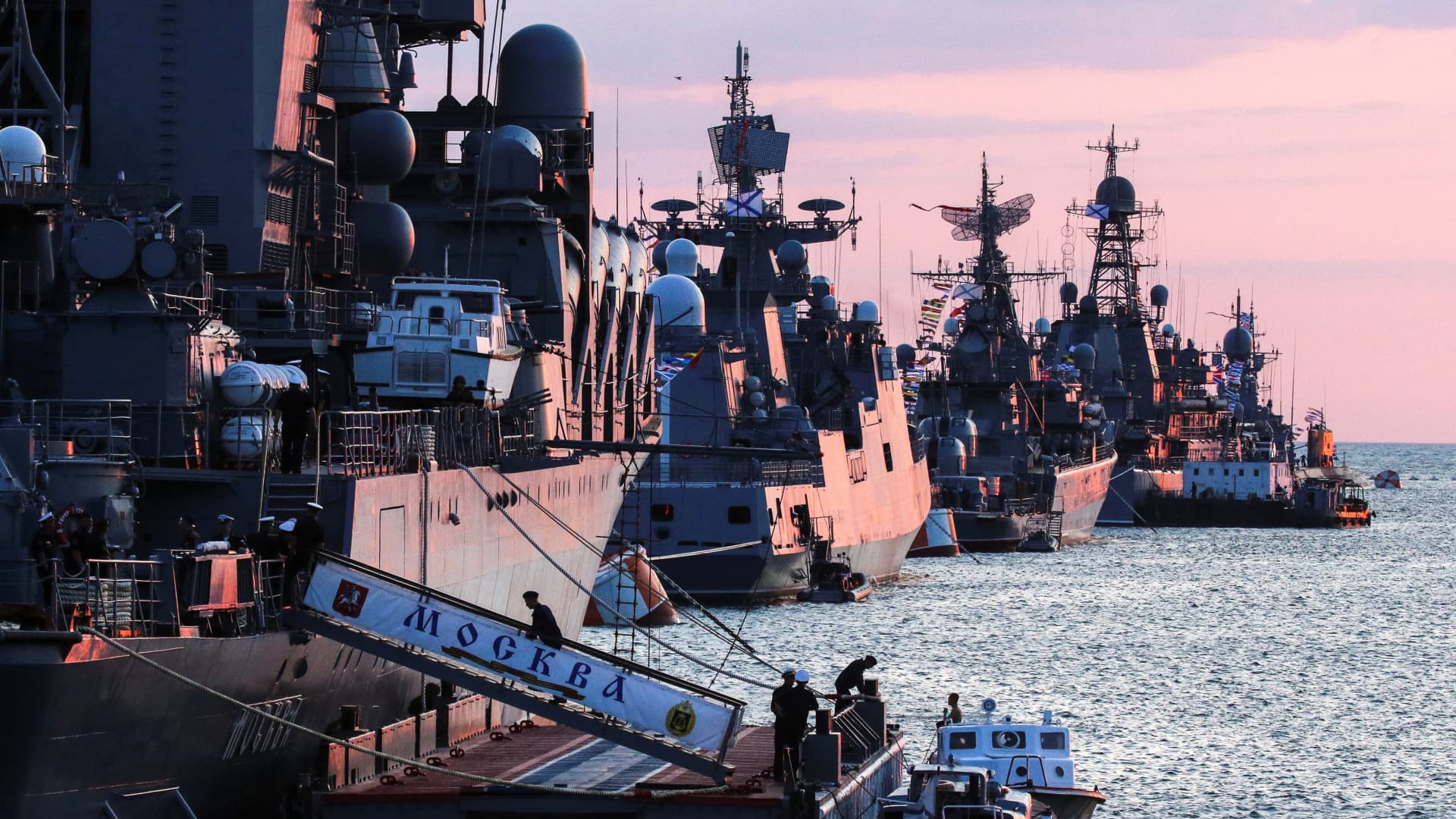
More international sanctions were imposed on Russia for its 2016 U.S. election interference, its role in cyberattacks against the U.S. and a 2018 nerve agent attack in the U.K., among other misdemeanors, although Russia has regularly denied involvement in such events despite evidence to the contrary.
When it comes to the current situation with Ukraine, Western allies have again threatened a tough response to Russia — but there has been public disunity over what punitive measures could be taken.
While the U.S. and U.K. favor more punitive action against Russia's economy should it invade Ukraine, there is hesitation in some European countries because of economic or diplomatic reasons. For example, Germany — Europe's de facto leader — is reluctant to see sanctions imposed on its giant gas pipeline project with Russia, Nord Stream 2, which will supply much of Europe with natural gas.
RBC Capital Market's Croft noted Sunday that "there is the question of whether any of the sanctions being discussed in Western capitals will deter President Putin if he is intent on bringing Ukraine firmly back into Russia's orbit.
"Leading sanctions experts contend that the West could potentially change Putin's calculus if these nations were prepared to impose serious sanctions on the key Russian financial institutions (VTB, Sberbank, Gazprombank) and on energy exports (along the lines of what was done with Iran). However, barring Nord Stream 2, Washington has already indicated that it will seek to exempt energy from the punitive measures currently being prepared," she wrote.
Likewise, Croft added, "given that a number of Western asset managers hold the Russian financials, a key question is whether the U.S. and its European allies would really blacklist these institutions."
Critical week ahead
Global markets are likely to remain nervous this week that there could be an imminent military conflict between Ukraine and Russia, while Western officials are set to hold further crisis meetings on the situation.
On Monday, the EU's Foreign Affairs Council will meet in the afternoon and NATO Secretary General Jens Stoltenberg will hold talks with foreign affairs ministers from Finland and Sweden.
Then on Tuesday, political advisors from Russia, Ukraine, France and Germany will hold "Normandy format" talks on eastern Ukraine in Paris, according to Reuters.
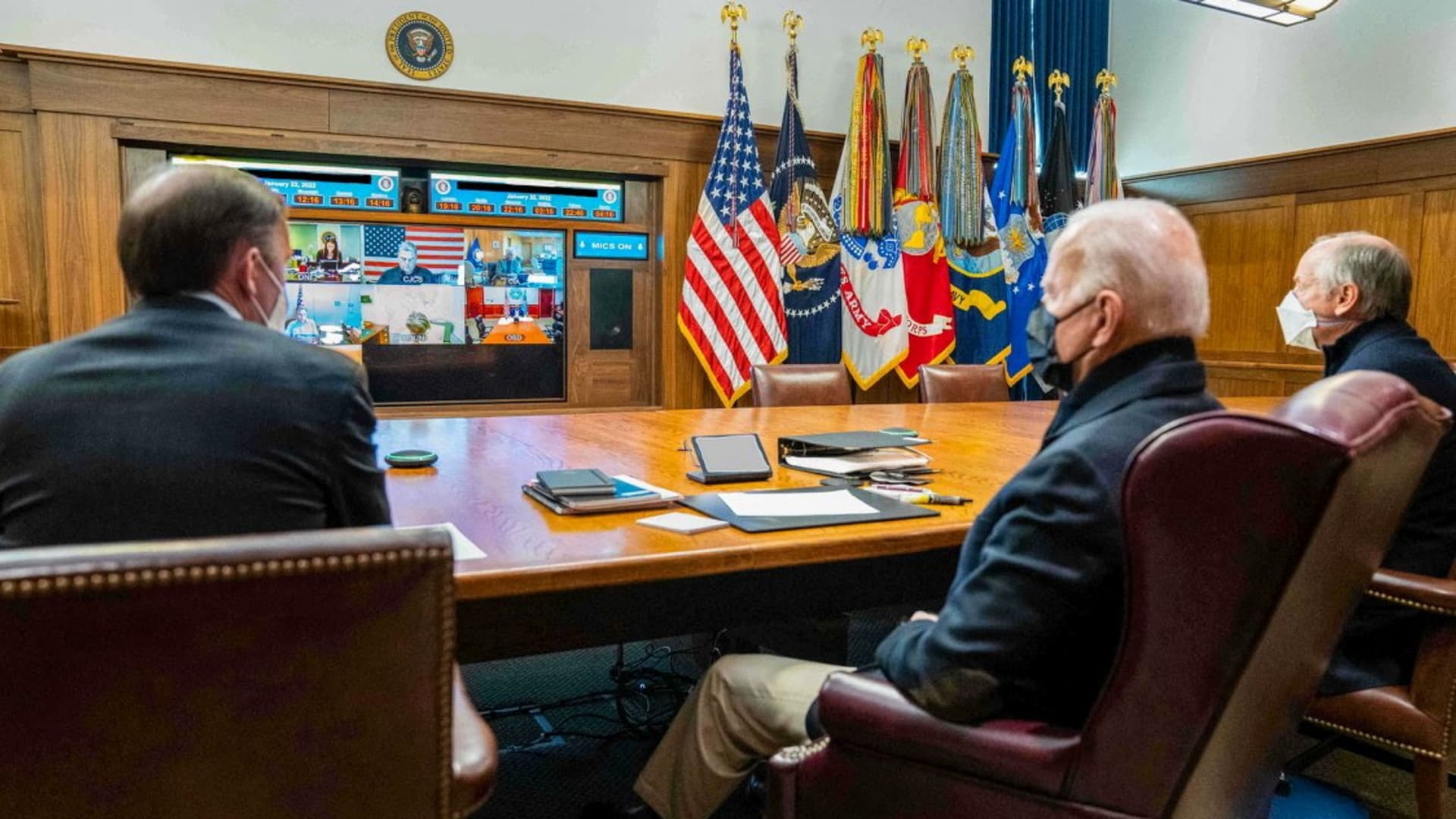
With tensions ratcheting higher, Biden is reportedly considering deploying several thousand U.S. troops, as well as warships and aircraft, to NATO allies in the Baltics and Eastern Europe, which would represent a significant expansion of American military involvement, according to The New York Times.
As Ukraine is not a member of NATO, the military alliance is not obliged to defend it, posing the question over just how far the U.S. and EU are willing to go to defend Ukraine, however.
On Sunday, U.S. Secretary of State Antony Blinken told CBS that the U.S. remained committed to diplomacy and dialog with Russia but "even as we're doing that we're building up defenses, we're building up deterrents." If Russia does invade Ukraine, there will be "massive consequences," he added.
Meanwhile, the U.K.'s deputy prime minister, Dominic Raab, said Sunday that "Ukraine is a free country under international law, it should decide its own fate, we will support them in defending themselves." He added that there will be "very serious consequences if Russia takes this move to try and invade, but also install a puppet regime."
He said that any prospect of a British military deployment to Ukraine was "extremely unlikely," however.
"What we have said is that we are already willing and engaged in training programs to support the Ukrainians defending themselves. That's absolutely right for defensive purposes. Secondly ... we want to make sure that the economic cost to the Kremlin of doing so (invading) is sufficiently severe that they think twice," he told Sky News on Sunday.






